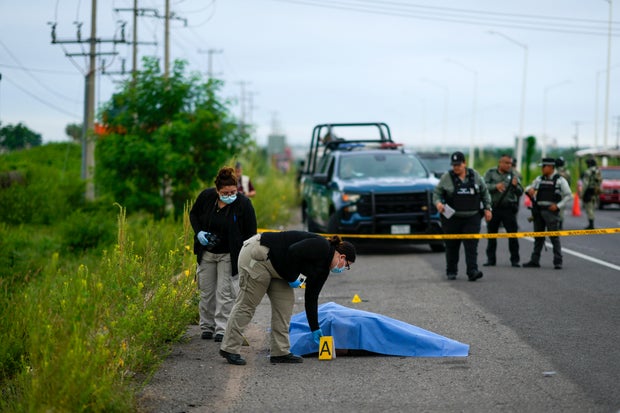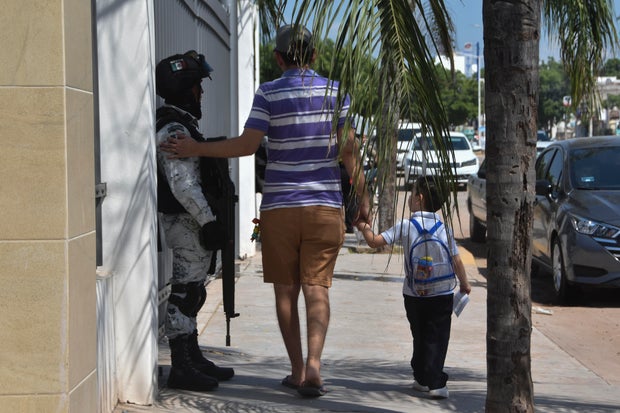CBS News
Harris campaigns in Michigan, works to shore up support with Black men

Watch CBS News
Be the first to know
Get browser notifications for breaking news, live events, and exclusive reporting.
CBS News
Sean “Diddy” Combs seeking release of names of his accusers

Lawyers for Sean “Diddy” Combs asked a New York judge Tuesday to force prosecutors to disclose the names of his accusers in his sex trafficking case.
The lawyers wrote in a letter to a Manhattan federal court judge that the hip-hop music maker needs to know the identities of his alleged victims so he can prepare adequately for trial.
Last week, a May 5 trial date was set for Combs. He has pleaded not guilty.
Prince Williams / Wireimage / Getty Images
A spokesperson for prosecutors declined comment.
Combs, 54, remains incarcerated without bail after his Sept. 16 federal sex trafficking arrest. His lawyers have asked a federal appeals court to let him be freed to home detention so he can more easily meet with lawyers and prepare for trial.
So far, judges have concluded he is a danger to the community and cannot be freed.
The request to identify accusers comes a day after six new lawsuits were filed against Combs anonymously to protect the identities of the alleged victims. Two of the accusers were identified as Jane Does while four men were listed in the suits as John Does. The suits claim he used his fame and promises of boosting their own prospects in the music industry to persuade victims to attend lavish parties or drug-fueled hangouts where he then assaulted them.
The plaintiffs in Monday’s lawsuits are part of what their lawyers say is a group of more than 100 accusers who are in the process of taking legal action against Combs.
In their letter Tuesday to Judge Arun Subramanian, attornies for Combs said the case against their client is unique in part because of the number of accusers. They attributed the quantity to “his celebrity status, wealth and the publicity of his previously settled lawsuit.”
That reference appeared to cite a November lawsuit filed by his former girlfriend, Cassie, whose legal name is Casandra Ventura. Combs settled the lawsuit the next day but its allegations of sexual and physical abuse have followed him since.
The Associated Press does not typically name people who say they have been sexually abused unless they come forward publicly, as Ventura did.
Combs’ lawyers said the settlement of Cassie’s lawsuit, along with “false inflammatory statements” by federal agents and Combs’ fame have “had a pervasive ripple effect, resulting in a torrent of allegations by unidentified complainants, spanning from the false to outright absurd.”
They said the lawsuits filed Monday, along with other lawsuits, and their “swirling allegations have created a hysterical media circus that, if left unchecked, will irreparably deprive Mr. Combs of a fair trial, if they haven’t already.”
The lawyers wrote that the government should identify alleged victims because Combs has no way of knowing which allegations prosecutors are relying on in their accusations in an indictment.
“To the extent Mr. Combs is forced to mount a defense against criminal allegations that the government does not seek to prove at trial, he is entitled to know that,” the lawyers said.
The indictment alleges Combs coerced and abused women for years, with the help of a network of associates and employees, while using blackmail and violent acts including kidnapping, arson and physical beatings to keep victims from speaking out.
CBS News
Threats after Nazi uniform controversy forces Massachusetts restaurant to close temporarily

HUDSON – A restaurant in Massachusetts was forced to close temporarily after threats were made against its workers. The messages came days after the staff served World War II reenactors who were in the restaurant wearing Nazi uniforms.
A group of historians from the American Heritage Museum went to the Kith and Kin in Hudson to have dinner Saturday night. The restaurant said four were dressed as American soldiers, one as a military nurse and two were dressed as SS soldiers.
Kith and Kin restaurant apology
The restaurant owners apologized on their Facebook page Sunday.
“In hindsight, they should have been asked to change before being seated. Even though we knew they were living historians, at a time when acts of anti-Semitic violence continue to rise, we should have realized other diners might not be aware of the local WWII re-enactment,” the statement said.
“We would never intentionally do anything to offend or hurt anyone in the community. If we truly thought these individuals held anti-Semitic beliefs, we would never have allowed them to step foot in the restaurant. As a small, family-owned business, we strive every day to do our best and are continuing to learn and grow. Last night we fell short, and we deeply apologize.”
Restaurant threatened
Despite the apology, the restaurant was forced to shut down temporarily Tuesday because, they say, of threats.
“After last night’s news airings, our restaurant has been the target of increased harassment and threats. Therefore, for the safety of our staff, we will unfortunately be closed today, Tuesday, October 15,” the owners said in another Facebook post.
The museum, which is also based in Hudson, said it’s not appropriate to wear the uniforms outside of an historical or educational context.
“Beyond thoughtless”
“Let’s put that in context. It’s at a time when acts of antisemitic violence are on the rise, when neo-Nazis have taken to the streets, a Holocaust continues to be denied. So wearing German uniforms in a public space, that’s beyond thoughtless. That’s repugnant,” American Heritage Museum Trustee Gary Lewi told WBZ-TV.
Lewi said the museum doesn’t even allow costumes with SS collars on their property.
“It does not exist off the field, which is why there are strict protocols that the American Heritage Museum has regarding what to wear, when to wear it, how to wear it and clearly that protocol was violated,” he said.
Lewi added, “It’s not a hate crime. It’s stupidity.”
The museum said it would tighten costume protocols and consequences.
CBS News
Why cellphone chats have become death sentences in cartel stronghold in Mexico

Cellphone chats have become death sentences in the continuing, bloody factional war inside Mexico’s Sinaloa drug cartel.
Cartel gunmen stop youths on the street or in their cars and demand their phones. If they find a contact who’s a member of a rival faction, a chat with a wrong word or a photo with the wrong person, the phone owner is dead.
Then, they’ll go after everyone on that person’s contact list, forming a potential chain of kidnapping, torture and death. That has left residents of Culiacan, the capital of Sinaloa state, afraid to even leave home at night, much less visit towns a few miles away where many have weekend retreats.
“You can’t go five minutes out of the city, … not even in daylight,” said Ismael Bojórquez, a veteran journalist in Culiacan. “Why? Because the narcos have set up roadblocks and they stop you and search through your cellphone.”
And it’s not just your own chats: If a person is traveling in a car with others, one bad contact or chat can get the whole group kidnapped.
That’s what happened to the son of a local news photographer. The 20-year-old was stopped with two other youths and something was found on one of their phones; all three disappeared. Calls were made and the photographer’s son was finally released, but the other two were never seen again.
Eduardo Verdugo / AP
Residents of Culiacan had long been accustomed to a day or two of violence once in a while. The presence of the Sinaloa cartel is woven into everyday life there, and people knew to stay indoors when they saw the convoys of double-cab pickups racing through the streets.
But never have they seen the solid month of fighting that broke out Sept. 9 between factions of the Sinaloa cartel after drug lords Ismael “El Mayo” Zambada and Joaquín Guzmán López were apprehended in the United States after flying there in a small plane on July 25.
Zambada claimed he was kidnapped and forced aboard the plane by Guzmán López, causing a violent battle between Zambada’s faction and the “Chapitos” group led by the sons of imprisoned drug lord Joaquin “El Chapo” Guzmán. “El Chapo” is serving a life sentence in a maximum security prison in Colorado after being convicted in 2019 on charges including drug trafficking, money laundering and weapons-related offenses.
Zambada pleaded not guilty last month in New York in a drug trafficking case that accuses him of engaging in murder plots and ordering torture.
New generation of drug lords and a “chain of hunting”
Residents of Culiacan are mourning their old lives, when the wheels of the local economy were greased by cartel wealth but civilians seldom suffered – unless they cut off the wrong pickup truck in traffic.
But recently, bodies have appeared across Culiacan, often left slung out on the streets or in cars with either sombreros on their heads or pizza slices or boxes pegged onto them with knives. The pizzas and sombreros have become informal symbols for the warring cartel factions, underscoring the brutality of their warfare.
Juan Carlos Ayala, an academic who studies the anthropology of the drug trade at the Autonomous University of Sinaloa, said that following the arrests of Guzmán López and Zambada in July, a new generation of younger, more flashy and cosmopolitan drug lords have taken over.
They fight with extreme violence, kidnapping and cellphone tracking – not the old kind of handshake deals their elders used alongside shootouts to settle matters.
“There is a new generation of leaders of drugs and organized crime here, that has other strategies,” Ayala said. “They see that the tactic of shootouts hasn’t worked for them, so they go for kidnapping.”
“They catch one person, and he has messages from the rival group,” said Ayala. “So they go after him to squeeze more information, and that starts a chain of hunting, to catch the enemy.”
The new tactics are reflected in the huge wave of armed carjackings in and around Culiacan. Cartel gunmen used to steal the SUVs and pickups they favor for use in cartel convoys; but now they focus on stealing smaller sedans.
They use these to go undetected in their silent, deadly kidnappings.
Often, the first a driver knows is when a passing car tosses out a spray of bent nails to puncture his tires. Vehicles pull up front and rear to cut him off. The driver is bundled into another car. All that is left for neighbors to find is a car with burst tires, the doors open, the engine running, in the middle of the street.
/ AP
The State Council on Public Safety, a civic group, estimates that in the past month there have been an average of six killings and seven disappearances or kidnappings in and around the city every day. The group said about 200 families have fled their homes in outlying communities because of the violence.
Culiacan is no stranger to violence — a shooting broke out across the city in October 2019 when soldiers mounted a failed attempt to arrest another of Chapo Guzmán’s sons, Ovidio. Fourteen people were killed that day.
A few days later, civic activist Estefanía López arranged a peace march and 4,000 residents turned out for it. When she tried to do something similar this year, she could get only about 1,500 people to attend a similar demonstration.
“We got a lot of messages beforehand from a lot of people who said they wanted to join and march, to support the cause, but who were afraid to come,” López said.
There’s reason to be afraid: Last week, gunmen burst into a Culiacan hospital to kill a patient previously wounded by gunshots. In a town north of Culiacan, drivers were astonished to see a military helicopter seeking to corral four gunmen in helmets and tactical vests just yards from a highway; the gunmen were shooting back at the chopper.
The government’s response to all this has been to blame the United States for stirring up trouble by allowing the drug lords to turn themselves in, and to send in hundreds of army troops.
But irregular urban combat in the heart of a city of 1 million inhabitants – against a cartel that has lots of .50-caliber sniper rifles and machine guns – is not the army’s specialty.
Squads of soldiers went into a luxury apartment complex in the city’s center to detain a suspect and they wound up shooting to death a young lawyer who was merely a bystander.
López, the peace activist, has been asking for soldiers and police to be posted outside schools, so children can return to classes – most are currently taking classes online because their parents judge it too dangerous to take them to school.
But police can’t solve the problem: Culiacan’s entire municipal force has been temporarily disarmed by soldiers to check their guns, something that’s been done in the past when the army suspects policemen are working for drug cartels.
The local army commander recently acknowledged that it’s up to the cartel factions – not authorities – when the violence will stop.
“In Culiacan, there is not even faith anymore that we will be safe, with police or soldiers,” López said, noting that that has had a clear effect on daily life and the economy. “A lot of businesses, restaurants and nightclubs have been closed for the past month.”
Laura Guzmán, the leader of the local restaurant chamber, said about 180 businesses in Culiacan have closed, permanently or temporarily, since Sept. 9 and almost 2,000 jobs have been lost.
Local businesses tried to organize evening “tardeadas” – long afternoons – for residents who were afraid to go out after dark, but they didn’t draw enough customers.
“Young people are not interested in going out right now,” Guzmán said.
For those looking to get away from the violence temporarily, the seaside resort of Mazatlan used to be only 2½ hours away by car. But that’s not an option since last month when cartel gunmen hijacked passenger buses, forced the tourists off and burned the vehicles to block the road to Mazatlan.
That leaves just one option, and one only open to some.
“Those who have the economic resources get out of the city by airplane to take a break,” Guzmán said.












